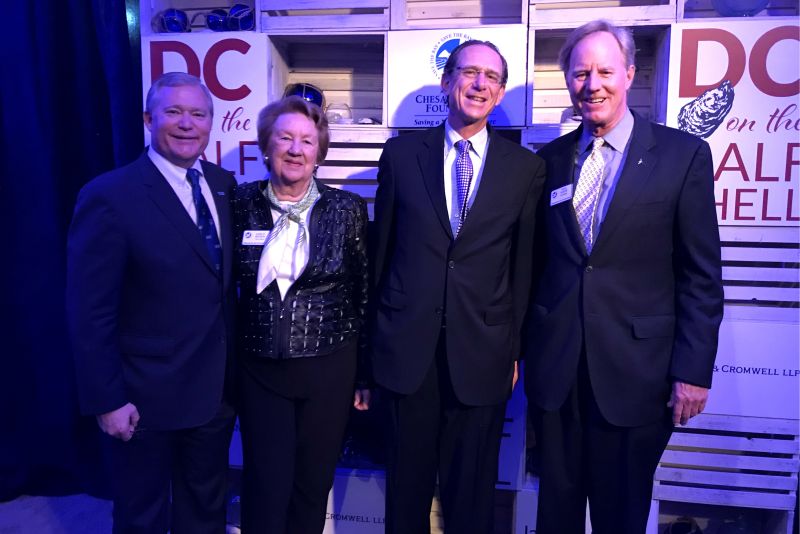Share this Story
Virginia Wesleyan Honored as "Conservationist of the Year" by Chesapeake Bay Foundation
Award recognizes VWU's new Greer Environmental Sciences Center
 Â鶹´«Ã½rtb was honored by the Chesapeake Bay Foundation (CBF) Feb. 26 with the organization’s top "Conservationist of the Year" award. CBF President Will Baker presented the award to Virginia Wesleyan President Scott D. Miller at the annual DC on the Half Shell gala in Washington, D.C.
Â鶹´«Ã½rtb was honored by the Chesapeake Bay Foundation (CBF) Feb. 26 with the organization’s top "Conservationist of the Year" award. CBF President Will Baker presented the award to Virginia Wesleyan President Scott D. Miller at the annual DC on the Half Shell gala in Washington, D.C.
The award recognized Virginia Wesleyan’s new Greer Environmental Sciences Center as well as the University’s vision and dedication to educating the next generation of Bay leaders.
“It is especially gratifying for us to be honored by such a distinguished and influential partner as the Chesapeake Bay Foundation,” said Dr. Miller. “With our campus situated at the mouth of the Chesapeake Bay and within a few miles of the Atlantic, we have a direct investment in the future of our natural environment and the systems that sustain us.”
Virginia Wesleyan opened its Greer Environmental Sciences Center in fall 2017. The 44,000-square-foot sustainable building was LEED Gold certified by the U.S. Green Building Council in January. The building features indoor and outdoor classrooms and teaching and research laboratories, including the Chesapeake Bay Aquatics Lab. Energy is produced by the building’s solar panels, and nearly 60 different plant species—including trees, shrubs, perennials, and aquatic plants—are grown in its research gardens and greenhouse. The site’s constructed wetlands and extensive green roof prevent polluted runoff from harming the Chesapeake Bay.
The University also uses the waterways around Hampton Roads as living classrooms. Students across disciplines conduct fieldwork on the Ocean Explorer, a 45-foot research vessel jointly owned by VWU and the Virginia Aquarium and Marine Science Center. Onboard the boat they collect data on marine organisms, collect and test water samples, and undertake other research.
Virginia Wesleyan’s Batten Honors College was also launched last fall. Named for Jane Batten and her late husband Frank, the Batten Honors College aims to educate impactful global citizens through an environmental focus, an international study-away experience, and leadership training and development. The program features vigorous exploration of diverse disciplines, from the natural sciences and mathematics to humanities and social sciences.
“Our current and prospective students in environmental studies represent a real hope in those disciplines for all of us,” said Dr. Miller. “They have embraced the cause of a cleaner, healthier environment that will enrich our lives, and the lives of generations to come, in Coastal Virginia and throughout the world.”
Over the years, VWU has worked with CBF on a number of initiatives, including scientific data collection, oyster restoration, and invasive species removal. Virginia Wesleyan is a participant in the newly launched Chesapeake 10 Billion Oysters Partnership, a coalition dedicated to helping recover the Bay’s oyster populations, and a member of Virginia’s No Child Left Inside Coalition, a collaborative effort between organizations to promote outdoor learning.
Â鶹´«Ã½rtb Board Chair David Kaufman and his wife Kay served as honorary co-chairs for the DC on the Half Shell event. Also in attendance were VWU Trustee Emerita Jane Batten, a major sponsor of the event, Board Secretary Cindy Rodriguez, Trustee Mary Haddad, and representatives from VMDO Architects and the Hourigan Group, who designed and constructed the environmental sciences center. CBF also presented Washington College with the Conservationist of the Year award.
All proceeds from the event support the Chesapeake Bay Foundation’s award-winning environmental education and habitat restoration programs. CBF takes 35,000 students, teachers and principals per year on field experiences of hands-on learning and critical analysis. The organization also engages thousands of volunteers in raising oysters, restoring oyster habitat, restoring underwater grass beds, and restoring forested buffers.
“We accept this award, and the responsibility it implies, with gratitude for this expression of trust, recognition, and appreciation by the Chesapeake Bay Foundation,” said Dr. Miller. “We pledge a firm and lasting commitment to the spirit of the mission and goals that the Foundation has articulated and embraced so well—and we look forward to the positive results this award will bring to Â鶹´«Ã½rtb, and indeed, to all of us who care so passionately about our natural world.”

